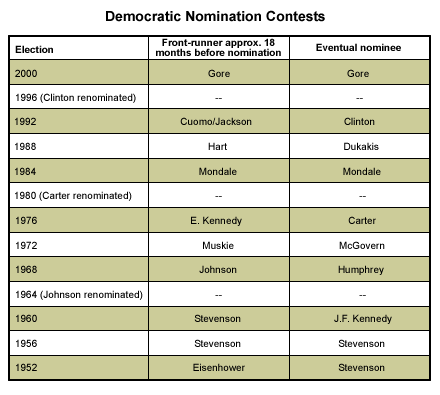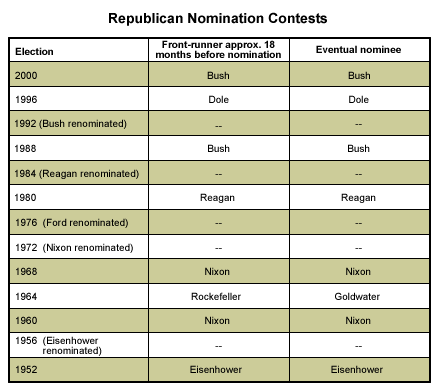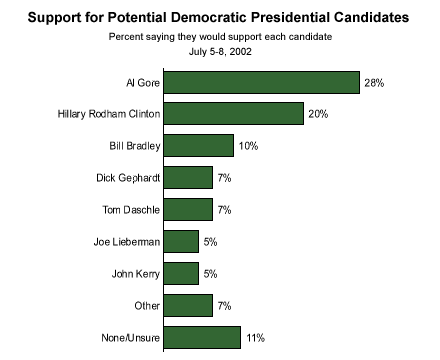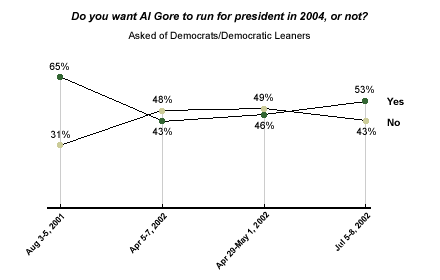"Early Front-Runners Are Generally Losers." That was the conclusion Gallup analysts made 20 years ago when they evaluated former Vice President Walter Mondale's election prospects. In January 1983, Mondale suddenly found himself the front-runner in the race for the 1984 Democratic presidential nomination, after the previous top vote-getter Sen. Edward Kennedy took himself out of contention.
Gallup's chief pollster at the time noted that in four out of the five Democratic contests held between 1952 and 1976, the early front-runner in each eventually lost his support and failed to get the nomination. Only Adlai Stevenson bucked this trend, in 1956. The outcome was different on the Republican side: in four out of five cases, the early Republican front-runner won his party's nomination.
Mondale did end up capturing the 1984 nomination after fending off significant challenges from John Glenn and Gary Hart (although he later lost the general election to Ronald Reagan). But what happened after that? Did Democratic nominations return to the volatile pattern seen earlier, or did the subsequent expansion of candidate war chests and power of the media somehow calm the political waters for early front-runners?
The question is an interesting one for Al Gore, who now holds a marginal lead among Democrats to be his party's nominee for president in 2004. It is obviously less relevant for George W. Bush, because sitting presidents from either party are virtually assured re-nomination.
The History of Early Front-Runners
Since 1984, there have been three competitive nomination contests for each party. On the Democratic side, in 1988 and 1992 the eventual nominee was someone other than the person who had been leading approximately 18 months before June of the election year (i.e., at the conclusion of the primary process). The winners in both cases, Michael Dukakis in 1988, and Bill Clinton in 1992, emerged as formidable candidates during the primary season, in the final months before the nomination. Only Gore in 2000 succeeded in winning the Democratic nomination after emerging as the early leader in the race. Can he do it a second time around?

In contrast to the historic volatility in the Democratic Party (Democratic early front-runners failed to win the nomination in seven out of 10 cases), the Republican Party has been highly predictable in its choices. The early front-runner went on to win the nomination in seven out of eight cases, with the exception of Nelson Rockefeller in 1964.

Democratic Candidates for 2004
According to Gallup's latest read on the field of potential 2004 Democratic presidential candidates*, conducted approximately 22 months before the nomination, Gore is supported by 28% of Democrats, while New York Sen. Hillary Rodham Clinton receives 20%. In the July 5-8 poll, former New Jersey Senator and 2000 Democratic presidential contender Bill Bradley garners 10% of Democratic support. The remaining candidates all receive single-digit level support. Notable among these are the Democratic Party's congressional leaders Rep. Dick Gephardt and Sen. Tom Daschle, who receive just 7% apiece, and former vice-presidential candidate and Sen. Joe Lieberman with 5%.

Gore's Slim Lead
Despite his lead, a troubling signal for Gore is the fact that he is far less dominant within his party today than he was at an equivalent point in the previous campaign. Gore currently leads his nearest challenger by only eight percentage points (28% versus 20% for Hillary Clinton). By contrast, in May 1998 his lead over second-place rival Jesse Jackson was almost 40 points (51% versus 12%). Gore maintained a sizable lead over the Democratic field through most of that campaign.
Adding to Gore's problems, only a bare majority (53%) of today's Democrats and Democratic-leaning independents say they want to see him run for the nomination in 2004. That number is up slightly from April, but lower than it was a year ago. More than four in 10 now say they would prefer he not run.

By all accounts, maintaining his front-runner status as a Democratic presidential candidate will be a formidable challenge for Gore.
*These results are based on telephone interviews with a randomly selected national sample of 1,013 adults, aged 18 and older, conducted July 5-8, 2002. For results based on this sample, one can say with 95% confidence that the maximum error attributable to sampling and other random effects is ±3%. In addition to sampling error, question wording and practical difficulties in conducting surveys can introduce error or bias into the findings of public opinion polls.
